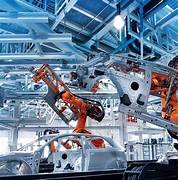
The Automotive Industry: Driving Innovation and Sustainability
Introduction
The automotive industry is one of the most dynamic and rapidly evolving sectors in the world today. From the invention of the first automobile by Karl Benz in 1885 to the modern electric and autonomous vehicles of today, the automotive industry has come a long way. In this article, we will explore the key trends and innovations shaping the automotive industry and how it is driving towards a more sustainable and connected future.
-
Electric Vehicles (EVs)
One of the most significant developments in the automotive industry in recent years has been the rise of electric vehicles (EVs). EVs are seen as a critical solution to reducing greenhouse gas emissions and combating climate change. Companies like Tesla, Nissan, and Chevrolet have made significant strides in producing affordable and practical electric cars for consumers.
Electric vehicles offer numerous advantages over traditional internal combustion engine (ICE) vehicles, including zero tailpipe emissions, lower operating costs, and quieter operation. The ongoing development of EV battery technology has also improved the range and charging speed of electric vehicles, making them more accessible and convenient for consumers.
-
Autonomous Vehicles
Another groundbreaking development in the automotive industry is the pursuit of autonomous vehicles, often referred to as self-driving cars. Companies like Waymo, Uber, and traditional automakers such as General Motors are investing heavily in autonomous vehicle technology.
Autonomous vehicles have the potential to revolutionize transportation by reducing accidents, alleviating traffic congestion, and providing mobility options for those who are unable to drive. However, the widespread adoption of autonomous vehicles still faces regulatory, technological, and safety challenges that must be addressed.
-
Connectivity and IoT
The Internet of Things (IoT) has made its way into the automotive sector, leading to the development of connected cars. These vehicles are equipped with sensors, GPS, and cellular connectivity, allowing them to communicate with other vehicles, infrastructure, and cloud-based services.
Connected cars offer a range of benefits, including real-time traffic updates, remote vehicle diagnostics, and enhanced safety features. They also pave the way for more efficient transportation systems, as vehicles can communicate with traffic lights and other infrastructure to optimize traffic flow.
-
Sustainable Manufacturing
In addition to the sustainability benefits of electric vehicles, automakers are also focusing on sustainable manufacturing processes. This includes reducing waste, energy consumption, and emissions in the production of vehicles. Many companies are adopting more eco-friendly materials and practices to minimize their environmental impact.
Furthermore, the recycling and repurposing of materials from old vehicles are becoming more common. For example, manufacturers are finding innovative ways to recycle batteries from electric vehicles and use them in stationary energy storage systems.
-
Mobility as a Service (MaaS)
The concept of Mobility as a Service (MaaS) is gaining traction in the automotive industry. MaaS aims to provide a comprehensive and integrated approach to transportation, combining various modes of transportation such as public transit, ride-sharing, bike-sharing, and car-sharing into a single, seamless platform.
MaaS platforms make it easier for individuals to plan and pay for their journeys, reducing the need for private car ownership. This shift toward MaaS could lead to fewer vehicles on the road, reduced traffic congestion, and improved urban mobility.
Conclusion
The automotive industry is in the midst of a significant transformation, driven by electric vehicles, autonomous technology, connectivity, sustainability, and changing consumer preferences. As the industry continues to evolve, it will play a crucial role in shaping the future of transportation and addressing pressing global challenges such as climate change and urban congestion.
In this era of innovation and sustainability, the automotive industry has the potential to provide safer, more efficient, and more environmentally friendly transportation options for people around the world. It is an exciting time for the automotive sector, and the developments outlined in this article are just a glimpse of what the future holds for this ever-evolving industry.





